Iran has set a goal to become the seventh largest steel producer in the world by 2025, but in the current situation it is unlikely to succeed.
Donald Trump on Friday imposed extended economic sanctions on Iran's steel industry in an attempt to punish the country for a missile strike earlier this week on two US military bases in Iraq.
Sanctions are both primary and secondary. This means that they will apply to third parties doing business with Iran.
The latest round of sanctions includes some of the previously sanctioned steel, copper and aluminum producers in Iran and the Chinese trading company Pamchel Trading Beijing Co. Ltd., which has been purchasing thousands of metric tons of steel slabs each month from the largest steel producer in the Middle East, Iranian Esfahan Mobarakeh Steel Company, which has also come under sanctions.
In addition, Saba Steel, Hormozgan Steel Company, Oxin Steel Company, Khorasan Steel Company, South Kaveh Steel Company, Iran Alloy Steel Company, Golgohar Mining and Industrial Company, Chadormalu Mining and Industrial Company, Arfa Iron and Steel Company, Khouzestan Steel Company and Iranian Ghadir Iron & Steel Co.
OFAC also imposed sanctions on the Oman-based Reputable Trading Source LLC, which is affiliated with the Khouzestan Steel Company.
The OFAC sanctions list also includes a number of leading companies operating in the aluminum and copper sector in Iran: Iran Aluminum Company, Al-Mahdi Aluminum Corporation, National Iranian Copper Industries, Khalagh Tadbir Pars Co.
“As a result of these actions, we will end billions of dollars of support for the Iranian regime,” said Secretary of State Mike Pompeo.
Iran produced 24.5 million tonnes of steel in 2018, making it the 11th largest metal producer, according to Worldsteel.
The complex web of sanctions imposed by the US since 2018 already bans almost all transactions in the Iranian economy for US and foreign companies, under threat of financial and criminal penalties.
Trump also issued a new executive order giving his administration even broader powers to impose sanctions on foreign companies that continue to operate in Iran.
Numerous sanctions programs have already resulted in most foreign banks being wary of processing any transactions with Iran, including imports of food and drugs, which are nominally allowed under the US sanctions program.
The EU-sponsored mechanism created to bypass dollar transactions with Iran, the Instex exchange, failed to function effectively.
“We have warned Instex and others that they are likely to be subject to secondary sanctions,” said US Treasury Secretary Steve Mnuchin. But he added that the US is working with Switzerland to create a regulator to handle humanitarian deals with Iran.
U.S. sanctions cut Iranian oil exports, critical to the economy
Subscribe to news 
Metallurgy news
- Today
14:00 14:00 12:00 Haluk Kayabaşı: Anti-dumping duty on stainless steel will be the key to new investments 12:00 U. S. releases final subsidy rates for BASIC steel from four countries
11:00 U.S. wire exports rose 2.9 percent in August 2025 compared to July 11:00 Imports of rolled steel products to the United States increased by 2.3 percent in August 2025 compared with July 10:00 Canada supports AD/CVD orders for valve imports from three countries 10:00 Turkey's Kardemir has released planned sales volumes for the 1st quarter of 2026
Publications
26.12 Keratin for hair care restoration and protection 25.12 Diode lasers from Alvi Prague 25.12 Services of the exporter of Budivelny Smith 24.12 old furniture - how to dispose of it correctly 24.12 The computer does not start, beeps or shows a black screen: diagnostics by sounds and what to fix






